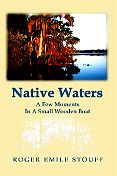|
There's been no relief here. Almost daily, banshee
winds howl from dawn to dusk, knocking over garbage
cans, rattling street signs, tossing debris around.
I don't recall a spring like this. Even the windy
spring of 2001 wasn't this bad.
This week I made one scouting trip to the lake,
only to find water levels extraordinarily low
from the westerly and north-westerly winds.
Everything was muddy, too, like well-milked
coffee. It was good to be there again, but
useless to attempt to fish.
Other parts of Louisiana are reporting wonderful
catches, but those areas affected by the
Atchafalaya River are hit-and-miss, even for
those brave enough to fight the winds. I could
maybe do it with spinning tackle, but boat
control is a frustrating consideration at best,
and the condition of the water in my immediate
area is not very promising.
So I am still pretty much grounded. I sit at
home and try to involve myself in worthwhile
projects, but don't have the heart. There's
something else, too. Something missing from
spring besides lake water, fly rods and fish.
My father's people had many special and revered
animals in our culture. Among them was kich
(pronounced "keesh"). This was a little
mottled-brown bird, probably some variation of
wren, that would speak to our people and we spoke
to it. Kich would warn Chitimacha
of danger, if friendly visitors were coming, if
hostiles were coming, if there would be rain or
flooding. The old people knew exactly which sounds
kich made to indicate each event.
The only exception was flooding: If there was a
flood coming, kich would circle
silently overhead, as if afraid to come down.
My grandmother was the last one who could talk
to the bird, even though she wasn't Chitimacha
by blood, though moreso in spirit than many.
She was taught to understand it, to speak to it,
by her mother-in-law. Each spring, after the
winter finally faded into memory, kich
would come and speak to her. It would perch in
the big fig tree in the back yard, and they'd
converse there. I remember holding her hand as
a small child, listening in wonder as the little
bird would shriek to her, and she would answer
in Chitimacha.
Kich also predicted death from
time to time, but in my recollection such a
prophecy was never made, or if it was, my
grandmother kept it to herself.
When she passed from this world to join her
Creator in 1997, I was already living in the
old house where she had spent seven decades
of her life. In that first year, kich
came to me. I don't know how I recognized it
among the sounds of all the other birds. Perhaps
from my childhood memories the tenor of its call
conjured recognition. But it perched in the fig
tree every year since then, speaking to me,
giving omens, promises and prophecies.
I do not understand it, because I was not taught
Chitimacha. Like my mother's people, who were
Cajun, my elders had been absorbed, taught to
believe that such things were an embarassment,
something to be ashamed of, something that kept
their children from being accepted in the American
world. My elders were taken to Carlisle Indian
School and beaten if they uttered a word of their
native languages. I know only a few sparse words
now. I believe that the language needed to speak
to kich was not only Chitimacha,
but a translation of the words necessary to
converse with the bird into Chitimacha. That
dialect likely died with my grandmother.
Yet the little bird came to me every spring,
and I'd go sit with it, listen, at least give
it company, at least let it know someone still
believes. If everyone stops believing in something,
it ceases to exist.
I still believe, but I have not heard kich
in the fig tree this year, and I am growing concerned.
I have come to rely on its presence each spring,
looking forward to it. In my perceptions of our
visits, though I could not understand, I liked
to think that in addition to whatever news it
brought me, we shared memories of the old woman
who for seventy years was its sole companion,
its only confidant and solitary believer.
Has it grown frustrated with my inability to
comprehend? Have I failed to recognize some
warning, some promise? Or is the strength of
belief from just one man not strong enough to
sustain it? My faith is not as strong as hers,
my will not so resolute.
So I sit and listen, longing for the sound of
a little mottled-brown bird in the fig tree.
Sometimes I curse myself for my indiscretions.
I am like Rabbit. For two-thirds of my life, I
turned my back on my grandfathers, despising the
boundaries, prejudices and pitfalls of being
their heir. I am like Rabbit, who was ordered
by the Creator to bring medicine to a very sick
little girl. Rabbit was warned not to wander or
stray from the signs, but Rabbit did and got lost.
In his haste to make up time he fell and split his
lip on a sharp rock, a mark he still carries today
to remind him of his indiscretion. Though I
eventually came back to my blood and embraced it,
I am like Rabbit. My lip is split, and I have no
strength to make things right.
If everyone stops believing in something, does
it cease to exist? I have always felt this. I
have also always felt that sometimes it doesn't
matter if you believe in something or not, so
long as something believes in you. The little
bird believed in me for seven years, and now I
wonder, have I failed its confidence somehow?
I am longing for lake water, for the back ends
of dark canals, and for little mottled-brown
birds this spring. They are my fulcrums. The
pivots upon which my existence revolves. My
grandmother, the last medicine woman of the
tribe, cured herself of throat cancer in the
1970s. She did this by finding the roots of
the plant she called bahjootah, which grew in
my back yard. I was with her when she collected
it, but it no longer grows there. I don't know
it's taxonomical name, and barely remember what
it looked like, but she drank the tea she made
of the roots for six months, the six months she
was given by doctors to live, and the cancer
vanished. She lived twenty years more and died
a natural death.
There is no bahjootah in the back
yard anymore, and I fear there will be no kich
in the fig tree this year. I am not strong enough
to keep them extant. My lip is split, and no matter
how I have hurried to make up the time I lost, perhaps
I am too late after all. ~ Roger
 It's out! And available now! You can be one of the
first to own a copy of Roger's book. Native Waters: A
Few Moments in a Small Wooden Boat
It's out! And available now! You can be one of the
first to own a copy of Roger's book. Native Waters: A
Few Moments in a Small Wooden Boat
Order it now from
www.iuniverse.com, Amazon.com,
or Barnes & Noble.com.
Roger will also be giving away three autographed copies to
readers. Stay tuned, for an announcement on the Bulletin
Board on that soon.
|


 It's out! And available now! You can be one of the
first to own a copy of Roger's book. Native Waters: A
Few Moments in a Small Wooden Boat
It's out! And available now! You can be one of the
first to own a copy of Roger's book. Native Waters: A
Few Moments in a Small Wooden Boat